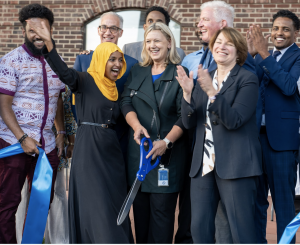Minnesota Health Centers Receive 7 million from Government Funding Package to Enhance Infrastructure
With passage of the FY23 Omnibus bill, Minnesota Health Centers receive valuable capital investment and policies to enhance their ability to serve Minnesotans.
MINNEAPOLIS , MINNESOTA , UNITED STATES , February 5, 2023 /EINPresswire.com/ -- The Minnesota Association of Community Health Centers (MNACHC) is pleased that Congress passed the FY23 Omnibus bill, as the legislation substantially impacts policies that govern and funding that fuels the important role of Minnesota’s 17 Community Health Centers.Through the work of Senators Klobuchar and Smith, and Representative Omar, four of Minnesota’s Community Health Centers will receive capital funding through this measure. Roughly $7 million will be immediately invested in capital projects in Minneapolis Community Health Centers including Native American Community Clinic, People's Center Clinics and Services, Indian Health Board, Inc and Southside Community Health Services. This investment will deepen and expand primary health care to the communities that these Health Centers serve.
“The Indian Health Board thanks all of Minnesota’s congressional leaders in both the Senate and the House of Representatives for their support for Urban Indian Health,” said Dr. Patrick Rock, CEO of Indian Health Board, Inc in Minneapolis. “This particular bill will help support the infrastructure needed to ensure the ongoing quality of healthcare in our community.” Dr. Rock went on to say that capital funding like this has typically not been available for urban Indian communities and that this is a, “historic capital investment in self-determined health care for our community.”
The four Community Health Centers are leveraging public and private funds to build new or renovate existing facilities to serve more patients and provide additional services.
“Thank you to our legislators and our partners for believing in the work we do and for providing this critical grant support to help us respond to the immediate and emerging needs of our community through culturally-responsive patient-centered care,” said Ann Rogers, CEO of Peoples Center Clinics and Services (PCCS) in South Minneapolis. “This funding transforms and expands the existing clinic space to a state-of-the-art health clinic and wellness hub offering accessible, comprehensive, integrated, and cultural resources under one roof alongside health services, dentistry, behavioral health, and a new walk-in clinic. Rogers added that PCCS has served the multicultural Cedar Riverside neighborhood of Minneapolis for the past 50 years as a trusted healthcare provider.
Additional space and services are critical infrastructure pieces that are necessary to meet the unprecedented increase in primary health care needs throughout the State’s urban core.
“This funding will support the purchase of equipment that will meet the myriad needs of our 14,000 patients per year, who make more than 45,000 patient visits to our medical, dental, vision, and behavioral health clinics,” said Ann Cazaban, CEO of Southside Community Health Services in Minneapolis. “The new clinic building in South Minneapolis will allow for the expansion of services such as mammography, making Southside the only health center in the state of Minnesota to offer breast cancer screening services at low or no-cost to patients,” Cazaban added that the new facility will also allow for extended hours into the evenings and on weekends to further reduce barriers to care.
In addition to its valuable capital investment, the FY23 Omnibus bill includes policies that will enhance the ability of the states’ 17 Community Health Centers to serve the nearly 200,000 Minnesotans throughout the state to whom they provide medical, dental and behavioral health care each year.
According to Jonathan Watson, MNACHC CEO, “by providing for 12 months of Medicaid continuous coverage for children, Health Centers can be sure that the children we serve will have access to key preventive screenings to keep them healthy and ready to learn in school.” Moreover, Watson noted, “the bill’s extension of pandemic-related telehealth services will enable Health Centers to continue to deliver primary care services to our seniors throughout the state.’ Watson additionally thanked Congress for the “significant funding increases to the Health Center program and the National Health Service Corps, a valuable workforce recruitment and retention program that Health Centers use.”
Sara Bolnick
Minnesota Association of Community Health Centers
email us here
Legal Disclaimer:
EIN Presswire provides this news content "as is" without warranty of any kind. We do not accept any responsibility or liability for the accuracy, content, images, videos, licenses, completeness, legality, or reliability of the information contained in this article. If you have any complaints or copyright issues related to this article, kindly contact the author above.

